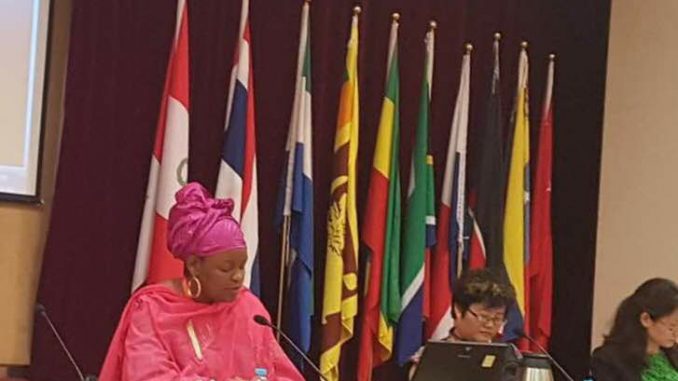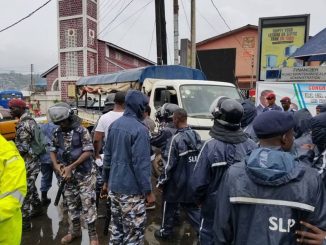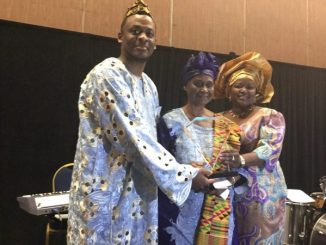
Minister of State II, Ministry of Foreign Affairs and International Cooperation, Hon. Isata Kabia on Friday, 30th June, 2017, said strengthening of capacity is crucial in the actualization of the 2030 Agenda as “there is a real opportunity for all of us to do thorough needs assessment so that capacity building through International Cooperation is demand and not supply driven.”
Speaking in Beijing, whilst delivering a paper on the ‘Role of International Cooperation in Strengthening Partnership and Capacity in implementing the 2030 Development Agenda’ at an ongoing Ministerial Workshop on International Cooperation in Capacity Development, Hon. Kabia said, the 2030 Agenda for Sustainable Development sets forth a global vision and what should now be ensured is, frameworks “which are country specific, established for the implementation, monitoring and following up of the Agenda based on country specific realities.”
The 2030 Agenda for Sustainable Development she said, is to serve as a universal, integrated and formative road map for achieving ambitious targets such as eradicating extreme poverty and building a sustainable world over the period of 15 years.
On the Sustainable Development Goals (SDGs), the minister said, strengthening synergies between international cooperation and development enhances the results of employment, migration management and development policies, “and should therefore be integrated into poverty reduction strategies.”
The SDGs, she said, have ushered in increased public awareness on the priorities of global goals and that in the case of Sierra Leone, “simplified messages of the SDGs and targets have created increased awareness in the local population about the correlation between Social, economic and environmental links and development.”
Sierra Leone’s efforts in adapting the SDGs, she said, are captured in Pillar 2 of her development roadmap, the Agenda for Prosperity, which deals with the management of natural resources and “is in direct harmony with the objectives of SDGs 12, 13, 14 &15 which speak about issues of inclusive human settlement, safe resilient communities and climate change and its impacts.”
The country, she added, is currently implementing the SDGs against a backdrop of multiple recovery strategies, including the National Ebola Recovery Strategy. The essence of rebuilding, madam Kabia said, is critical and the way in which Sierra Leone is rebuilding herself has been emphasized in the country’s post Ebola Recovery Plan titled: Building Back Better.
Using the ebola outbreak as a case study that provides an opportunity for a more collaborative approach to development, minister Kabia said, the post ebola recovery plan for the three most affected countries “cannot be that dissimilar to the SDGs” and that the cross border nature of the ebola epidemic gives evidence to the view that “regional and global development affects the sustainable development of individual countries. It emphasizes the need for regional integration as a priority agenda.”
“The lessons must serve as the foundation for sustainable development. An aggressive agenda inclusive of all targets, a comprehensive plan with aid workers, international agencies feed into should be country owned to create the kinds of partnerships outlined in the SDGs.”
On capacity building areas for developing countries, minister Kabia highlighted monitoring and the evaluation of implementation; data collection; and financial management systems as being crucial. “Without the right baseline data, priorities would be skewed; without the monitoring tools, progress cannot be measured; and without sustainable financing, development would not be realized”, she said.
There should be a targeted focus on several aspects of development, she said, including strengthening capacity in a bid to strengthen institutions and improve on technical assistance provided to public sector institutions responsible for the formulation, designing and implementation of development plans, and public policies including Civil Society Organizations.
At the bilateral level, madam Kabia said, since 1971, both Sierra Leone and China “have carved out strong diplomatic relations out of mutual respect and understanding, solidified by an uncommon political trust,” further paying glowing tribute to China for the “unparalleled early steps they took in the recent battle against Ebola”
Undeniably, she said, China has played an unprecedented role in Sierra Leone, “but the role we have played for each other at the most critical times in our two nations is the yard stick by which we measure the strength of our diplomatic ties.”
Hon. Isata Kabia is in Beijing as part of an eight (8) man delegation attending the 2017 Ministerial Workshop on International Cooperation in Capacity Development for developing nations.
Other members in attendance are Minister of Youth Affairs, Bai Mamoud Bangura, Suafiatu Habib Tunis, Marian Yombo Conteh from the foreign ministry, Special Envoy in Trade Alieu Malador, Dauda M. Bangura from the Independent Media Commissioner, Aminata Bangura and Alie Conteh, Presidential Youth Aide.
John Baimba Sesay
Information Attaché
Sierra Leone Embassy
People’s Republic of China



